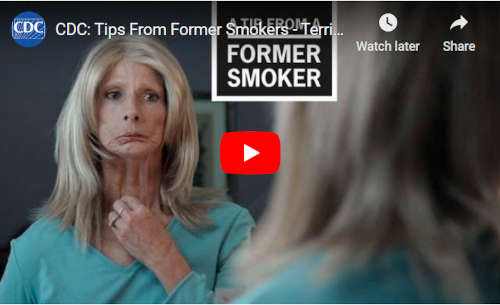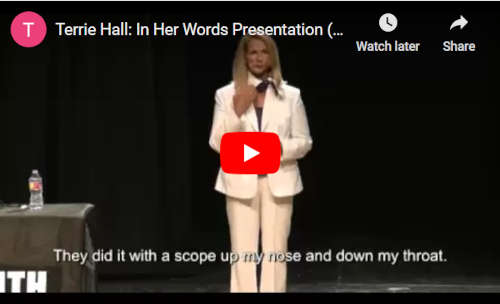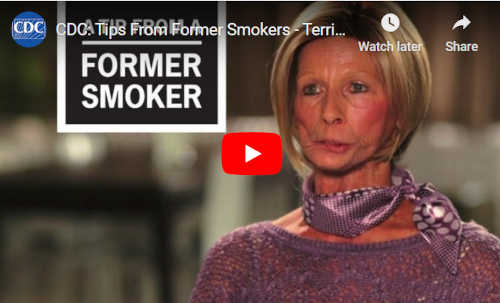America's face of smoking cessation, Terrie Hall, laid to rest
The world may never again see a more courageous ex-smoker than 53 year-old Terrie Linn Hall, the 13-year cold turkey quitter and laryngectomee made famous by the CDC's 2012 Tips from Former Smokers campaign.

A former smoker for 22 years, Terrie Linn Hall died Monday in a Winston-Salem, North Carolina hospital after a 13-year battle with mouth and larynx cancer that metastasized to her brain.
Funeral services are being held this morning, September 21 at 11:00 a.m. at Pinedale Christian Church in Winston-Salem. Deep and sincere condolences to Terrie's family and loved ones, including her surviving daughter Dana, and Terrie's three grandchildren.
While a vocal critic of the Centers for Disease Control (CDC) for using the Tips from Former Smokers Campaign to cram highly ineffective replacement nicotine down the throats of U.S. nicotine addicts, there's nothing but admiration for all ex-smokers who answered the higher calling, to try and awaken and motivate smokers to end their senseless self-destruction while still time.
And Terrie Linn Hall was clearly the bravest and hardest hitting of all.
As of this morning, Terrie's sobering March 2012 YouTube CDC Tips video has received 2,962,347 views [editor's note: more than 10 million views as of 11/10/20], more than double any other CDC Tips video. Why? Because Terrie displayed unprecedented courage in putting vanity aside while showing smokers where smoke's hundreds of toxins and 81 known carcinogens lead.
As Terrie herself would be the first to admit, if only she had put that untapped courage to use in quitting far sooner. But was it Terrie's fault that the CDC has yet to educate U.S. nicotine addicts as to why they'll really smoke that next cigarette, or the truth about how the vast majority of ex-smokers succeed?
Although Terrie smoked her first cigarette at age 13, she engaged in only "occasional" secret smoking as a cheerleader during high school. It wasn't until shortly after graduation that she found herself hooked solid and smoking a pack of Vantage menthols per day, before changing to Virginia Slims and then graduating to two packs-a-day of cheaper and sale menthol brands.
"My smoking really took off after I graduated from high school. It became an addiction," Terrie shared with high school students in 2011.
"I didn't know what addiction was. All I knew was I had to have it. I made a career out of smoking. And I tell you that because I would light one up as soon as my eyes opened in the morning. I would light one up when the phone rang. I would light one up after I finished eating. And it was the last thing I did before I closed my eyes at night."
For the next twenty-two years, nothing was allowed to get between Terrie and her next nicotine fix, not pregnancy with the premature birth of two daughters, not years of coughing and sore throats, not discovering a suspicious sore in her mouth in December 2000, not a biopsy that came back indicating mouth cancer, and not the 33 radiation treatments during 2001 which followed.
"One day, on down the road, I found a little sore on the inside of my mouth, and I thought maybe I had eaten something that upset my stomach or that I had bitten the inside of my cheek," she'd tell students. "Well, on a routine dentist appointment, the dentist thought it looked suspicious." So he did a biopsy that "came back as cancer of the mouth."
"I had to go though 33 radiation treatments. It was squamous carcinoma cancer," Terrie shared with students. "Well, the whole time I was going through radiation, I had a really bad sore throat. And I thought, 'Well Terrie, you're just smoking too much.' But you know what else I thought? I thought, 'You'd smoke too if you had cancer and you were going through radiation.'"
"That was no way for me to be thinking. If anything, I should have quit. Being diagnosed with cancer, I should have quit smoking."
"But, I continued to smoke all through my radiation, and I had a really bad sore throat. Well, after I completed my radiation, my voice started to deteriorate and it hurt to swallow and it hurt to eat food. So I decided I better get it checked out."
"I went to an ear, nose and throat specialist. And they did a biopsy," Terrie told them. "Well, within 24 hours I got the infamous phone call: 'Ms. Hall, we need you to come to our office and we need you to bring somebody with you.' Well, you know, I knew that wasn't good news, but I went. And they proceeded to tell me that I had a tumor on my larynx and that they were going to remove my voice box."
Terrie then related to students how a woman with a hole in her neck, a laryngectomee, came to visit her at home to help prepare her for what was about to occur. "Well you know, I couldn't wait for that woman to leave. I could not wait for her to get out of my house. I wanted a cigarette more than ever. And as soon as she left, I lit one right up."
"I was so addicted that the day of my surgery, I smoked right up to the front door of the hospital. That's how addicted I was."
Even after the tears that flowed after opening her mouth following surgery and hearing silence when trying to speak, even after her throat had been cut from ear to ear and her voice box, surrounding tissues and palate had been removed, even after her nose had been made a permanent ornament that was useless for smelling as her lungs had been rewired to breathe through a hole in her throat, Terrie's wanting to smoke nicotine did not end.
While fighting back tears during her second Tips video in March 2013, Terrie shared her moment of dependency awakening. "I didn't know that I was so addicted until after I got out of the hospital, when I went home. I went straight ... I went straight to my bedroom, picked up a cigarette, put it in my mouth and lit it. And for the first time, I really looked at myself in the mirror and I thought, 'Terrie what are you doing? You have a hole in your neck and you are getting ready to use what did it to you.'"
So how do we reconcile the Terrie who even then attempted to smoke, to the amazingly brave woman in the 2012 Tips video who'd lost her teeth, hair, voice and vanity to cancer radiation, surgery and treatment? They are one in the same.
I suspect that the Terrie being memorialized this morning was always brave. But courage and nicotine addiction are two different things.
To my thinking, the most important lesson from Terrie's story is nicotine dependency's amazing depth. Terrie isn't alone. Roughly half of smokers diagnosed with serious smoking related diseases fail to awaken to who they are: real drug addicts whose wanting for that next fix flows from the same brain dopamine pathways as the wanting and urges felt by the alcoholic, or the heroin, cocaine or meth addict.
Nicotine addiction is a mental illness, a brain wanting disorder in which nicotine compromised dopamine pathways assign nicotine use the same priority as they assign to eating foods or drinking liquids. For Terrie and earth's roughly one billion nicotine addicts, thoughts of permanently ending nicotine use are almost as unthinkable as the never-smoker thinking seriously about giving up food.
Researchers tell us that the dopamine pathway overlay between nicotine and food is substantial: wanting for food, wanting for nicotine; urges and craves for food, urges and craves for nicotine; "aaah" wanting relief when eating food, "aaah" wanting relief after using nicotine; with quitters turning to extra food after quitting in order to stimulate dopamine flow.
It's as if the primary lesson shared and taught by Terrie has been missed entirely by the CDC. It isn't about fear, a powerful initial motivator with little sustaining power, as we quickly grow numb to it. It's about the dependency lesson fear forced Terrie to eventually self-discover, a lesson the CDC should have taught her decades earlier.
I submit that the 400,000 Americans who smoke themselves to death each year will continue to do so until the central focus of future CDC campaigns becomes truth as to why they are doing so, truth about who we really are (real drug addicts, with a real mental illness), and truth about how the vast majority of smokers succeed in quitting (just like Terrie, by going cold turkey).
Rest in peace Terrie Linn Hall. You've done far more than your fair share. Once awakened, you went above and beyond what anyone had a right to expect. The Darth Vader voice you kidded about may have been silenced but your dreams and love live on in every nicotine addict your "real" message awoke.
Share this article |
More About Terrie Hall
|






